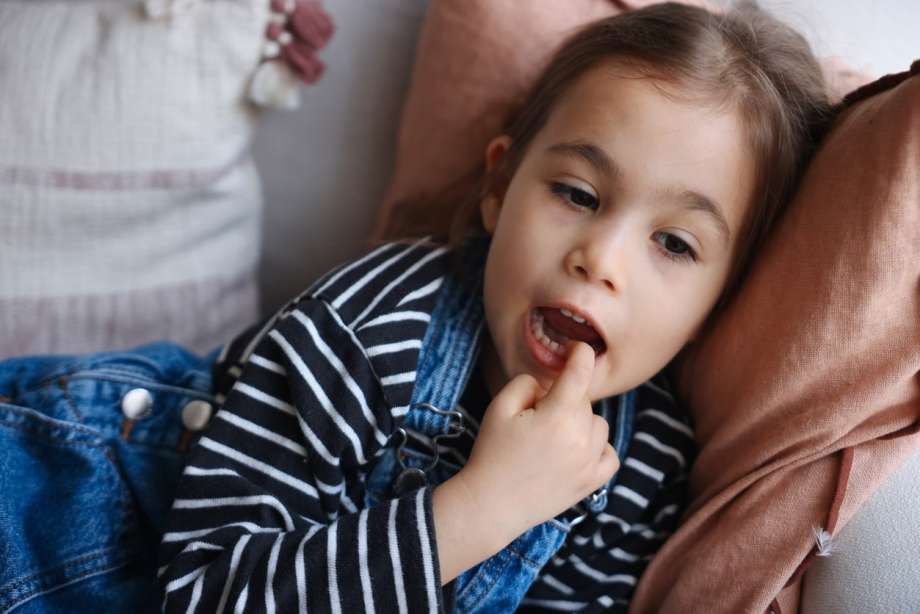Kids Grinding Teeth at Night: Causes, Effects, and How to Stop It

Are your kids starting to clench their jaw or grind their teeth?
If your child has started to complain of jaw/mouth pain or if their dentist has pointed out that they’re grinding their teeth and damaging their enamel, what can you do?
As parents, one of our biggest worries is keeping our children healthy and happy. When it comes to their health. When you discover your kids grinding teeth at night after hearing grinding noises come from their bedroom your first instinct may be to wake them up to make them stop.
But getting kids to stop grinding their teeth often requires professional treatment both to address the dental harm and the underlying cause of the behavior. Let’s take a closer look at kids grinding their teeth at night.
We'll explore the causes of why kids grind their teeth, the effects on dental health, and most importantly, how to prevent further harm.
Related: Caring for Your Toddler’s Teeth
What is Teeth Grinding?
Bruxism or adolescent teeth grinding in kids is a common problem in the early childhood years. The Sleep Foundation reports that it is common between the ages of 7-10, but can occur at any point, such as in babies or older school-aged children. Similarly, the Children’s Hospital of Philadelphia also reports that 3 out of 10 children will grind their baby teeth before the age of five.
According to International experts on bruxism and related Issues, bruxism is a repetitive jaw muscular activity characterized by teeth clenching or grinding and/or bracing or thrusting of the mandible that can occur during wakefulness or sleep.
Teeth grinding is often an unconscious behavior, also called a parafunctional habit. Most children who are doing it aren’t even unaware that it’s happening.
In mild cases of kids grinding their teeth at night, no physical symptoms will occur, but for more serious cases, your children may be able to identify that their teeth ache in the morning or have a headache.
Is it Normal for Kids to Grind Their Teeth?
Bruxism in kids is more common than you may think. It’s estimated that anywhere from 6% to 50% of children experience this early in their lives. This behavior typically occurs at night, when children are sound asleep, but may also take place throughout the day.
Teeth grinding may be a small phase that they quickly outgrow once their all baby teeth have fallen out. Generally, mild cases of bruxism in kids may not cause any significant harm to your child’s teeth.
However, severe cases of teeth grinding that continue into their teen years and adulthood have the potential to lead to several dental problems and affect your child's overall health.
For example, mild cases of bruxism in kids may not cause any significant harm to your child’s teeth. While your children may be clueless about this nighttime behavior. Pay close attention to when and how often you hear your kids grinding their teeth, so you can tell your child’s pediatrician or pediatric dentist if you become more concerned about the behavior.
Why Do Children Grind Their Teeth at Night?
It’s difficult to pinpoint the exact reason why bruxism in kids occurs. However, there are some common causes why children grind their teeth at night. Here are four of the most common causes.
Malaligned Teeth
If your child's teeth don't fit together properly — such as their lower teeth protruding past their upper teeth or any other ways their teeth or jaw are unaligned — they may grind their teeth unconsciously to try and find a more comfortable position.
Stress or Anxiety
Just like adults, children can experience stress and anxiety. Teeth grinding can be a way for them to release tension, even if they are not aware they are doing it.

Sleep Disorders
Children who have sleep apnea or those who snore may be more likely to grind their teeth at night. The Sleep Foundation reports that “people who have OSA or sleep-related bruxism should be aware that they may occur together,” and this is true for both adults and for children.
Adult Teeth Development
Many developmental factors may play a part in why your child is clenching or grinding their teeth, such as discomfort from baby teeth resorption or molars coming in. And just as a child’s development can change quickly, they may also simply outgrow teeth grinding as they grow and develop.
Regardless of whether your child is experiencing one of these common causes or something else is affecting them, if you're concerned about your child's teeth grinding, it's always a good idea to talk to their dentist or doctor. They may need dental work done or some other medical intervention.
The Effects of Teeth Grinding on a Child's Teeth
As mentioned earlier, teeth grinding can have detrimental effects on a child's teeth. Some of these effects include:
1. Tooth wear and tear
Grinding of teeth can result in the wearing down of tooth enamel, which can lead to tooth sensitivity, soreness, and pain. Eventually, once tooth enamel is worn down, they’ll lose some protection and their teeth may be more susceptible to cavities or chipped teeth.
While this enamel loss isn’t good in baby teeth, it is especially troubling if your older child is wearing down their permanent teeth because enamel cannot be replaced once it’s lost.
2. Cracked or chipped teeth
Like wear and tear, bruxism itself can cause excessive force on teeth. But instead of a slow progression to teeth issues, teeth grinding may lead to immediate issues, such as cracks and fractures, especially if the teeth grinding is forceful. This could lead to big problems, especially if they are grinding their permanent teeth.
3. Jaw problems
Sleep bruxism (or teeth grinding that occurs at any point in the day) can also cause issues with the temporomandibular joint, which connects the jawbone to the skull.
Temporomandibular joint disorders, also known as TMJ disorders, can cause significant pain and discomfort. Some common symptoms and side effects of teeth grinding are a locked jaw, difficulty opening the mouth, pain while eating, facial pain, earaches, headaches, and more.
4. Changes in tooth alignment
Consistent grinding can cause orthodontic changes in the way a child's teeth align or fit together, leading to bite problems or a misaligned smile.
While for some children with mild bruxism, this may be a vanity concern, those with a significant problem will experience pain from the orthodontic changes they are experiencing. A study published by the American Academy of Pediatric Dentistry also showed that malalignment of the teeth can also lead to bruxism.
5. Headaches
Headaches are one of the most common symptoms reported in pediatric dentistry when parents and children report sleep bruxism as being an issue. Kids grinding teeth at night may wake up with headaches in the middle of the night, or they may experience aching in the morning after a night of grinding has occurred.
How to Stop Nighttime Teeth Grinding
If you suspect that your child grinds their teeth at night, there are a few things you can do to help stop the habit.
1. Talk to your child's dentist and pediatrician
Your child's dentist can help identify the cause of their teeth grinding and recommend a plan of action. For example, they may suggest a mouth guard or other dental appliances that help to protect your child's teeth.
They may refer you to your child’s pediatrician if they suspect the cause of grinding is something they should be aware of, but even if they do not, it’s a good idea to keep both doctor’s offices aware that your child is experiencing bruxism.

2. Create a relaxing bedtime routine
Since stress and anxiety can contribute to teeth grinding, it's important to create a calm and relaxing bedtime routine.
For example, they may start by taking a warm bath, reading their favorite books, and cuddling their favorite stuffed animals. Before you leave your child’s room at night, consider practicing deep breathing exercises with them for an extra calming effect on both of you.
You may also want to consider adjusting the time they go to bed. And an overtired child may be more likely to grind their teeth. You may have to slowly dial back their bedtime in 15-minute increments, but doing so will likely help your child’s bruxism.
3. Encourage your child to relax their jaw
If your child tends to clench their jaw during the day, encourage them to relax their jaw muscles. Your dentist will be able to show you some exercises to help with this, such as showing them how to place their tongue between their teeth, how to stretch their jaw or practice other relaxation techniques.
4. Reduce caffeine intake
Caffeine can make teeth grinding worse. If your child consumes any caffeinated beverages, make sure to limit the caffeine for hours before bedtime. A few common sources of caffeine to limit or avoid include sodas, teas and coffee drinks, and chocolate snacks.
5. Address underlying issues
If your child's teeth grinding is related to an underlying issue, such as sleep apnea or stress, it's important to address these issues directly. This may involve working with their dentist, pediatrician, and maybe even a sleep specialist to develop a treatment plan created just for them.
By taking these steps, you can help your child stop grinding their teeth at night and protect their dental health. Remember, it's important to be patient and persistent – it may take some time to break the habit, but with the right approach, it is possible.
6. Splint Therapy
In primary sleep bruxism, occlusal splints and splint therapy have been regarded as a first-line treatment option to stop teeth grinding and tooth attrition. These splints are designed to cover the entire upper and lower dental arch and are generally not obtrusive or uncomfortable for the patient.
Splint therapy for teeth grinding works by addressing the symptoms of the grinding, preventing the force applied to your child’s teeth, and reinforcing good habits by making them aware of the behavior.
Using occlusal splints helps to prevent complications of bruxism while treating any underlying cause that may be responsible for the condition.
It can be alarming to hear grinding noises or witness your child grinding their teeth, but rest assured that it is both common and treatable. When you understand what’s causing it, whether it’s stress, anxiety, orthodontic issues, or normal child development, you’ll be able to take action and determine which methods will help alleviate this habit.
For more strategies on how to help kids with anxiety and relieve bad habits like teeth grinding, check out our tips on How to Help an Anxious Child.

